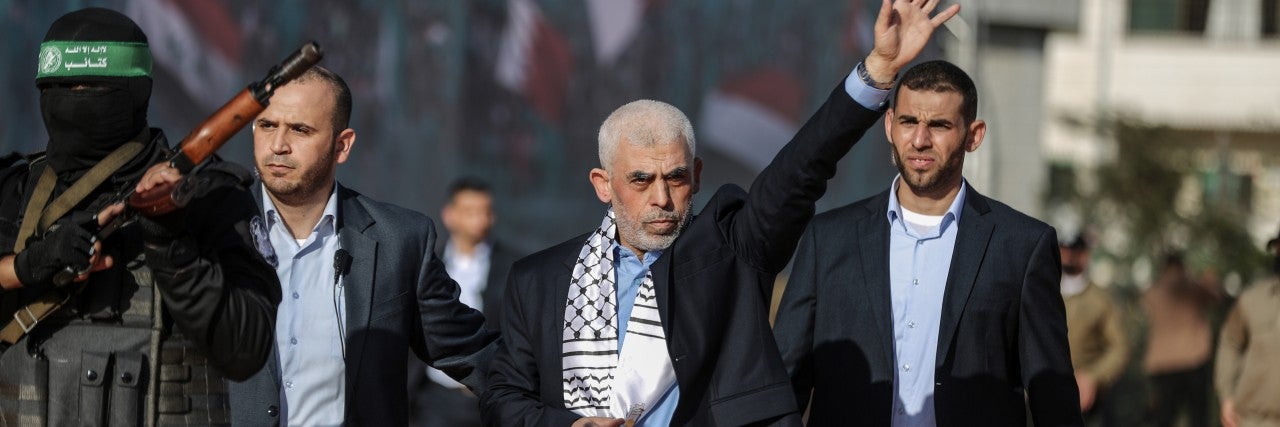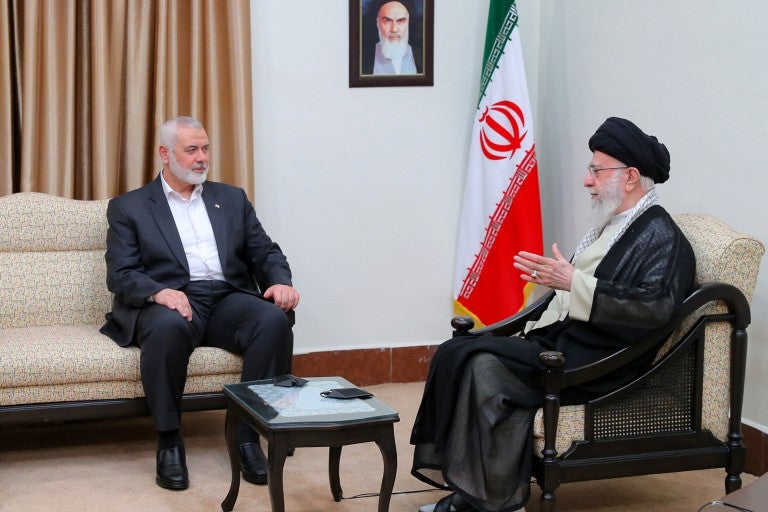August 7, 2024
Known as the mastermind behind the October 7 Hamas massacre that killed over 1,200 Israelis and took over 250 hostages, Yahya Sinwar has become one of the most wanted terrorists.
Dubbed the “Butcher of Khan Younis” for his role in interrogating, torturing, and killing alleged Palestinian informants for Israel, as well as Palestinians suspected of deviating from strict Islamic codes of behavior, when he was head of Hamas’ internal security service, Sinwar spent over two decades in an Israeli prison for his role in the murder of two Israeli soldiers. He was released in 2011 as part of the Gilad Shalit deal.
Following the assassination of Hamas’ Qatari-based political leader Ismail Haniyeh on July 31 in Tehran, which has widely been attributed to Israel, Sinwar has now replaced him as the “political leader” of Hamas, so he will now be in charge of the military and political branches of Hamas. This represents a full embrace of the pro-Iranian approach by Hamas as part of Tehran’s “Axis of Resistance” against Israel, along with its terror proxies.
Here are five things to know about Yahya Sinwar and what his promotion means for the future of the Israel-Hamas war.
Founding Role in Hamas
Yahya Sinwar was born on Oct. 29, 1962, in Khan Younis refugee camp in the Gaza Strip while it was under Egyptian occupation.
He later attended the Islamic University in Gaza, where he studied Arabic and Islamic studies. The university was a hotbed of political activism and Sinwar became involved in the Muslim Brotherhood, a Sunni Islamist organization known for its zealous anti-secularism, anti-Westernism, and other doctrinal elements that have spawned violent extremists/terrorist groups such as Hamas.
In the late 1980s, Sinwar was one of the founding members of Hamas, which was established during the First Intifada, a violent Palestinian uprising. He became a close associate of Hamas co-founder Sheikh Yassin, the spiritual and ideological leader of Hamas until his assassination by Israel in 2004.
The Butcher of Khan Younis
During the early years of the terror group, Sinwar helped establish al-Majd, Hamas’ internal security service. Al-Majd was responsible for identifying and eliminating collaborators with Israeli authorities, which helped him earn the nickname of the “Butcher of Khan Younis” for the brutal killing of suspected Palestinian informants and any others known to deviate from Hamas’ strict social code – employing such items as razor blades and machetes.
The Eyes of a Murderer
In 1988, Sinwar was arrested by Israeli authorities for his involvement in terrorist activities, including the abducting and murder of two Israeli soldiers and the murder of four Palestinians he accused of being collaborators, for which he received four life sentences from Israel.
While imprisoned, Sinwar’s reputation among Palestinian prisoners and Hamas members grew. Michael Koubi, an officer in Israel’s Shin Bet security organization who spent over 150 hours interrogating Sinwar, described him to ABC News as having “the eyes of a murderer.”
Palestinian activist and writer Ismat Mansour, who spent 15 years in the same prisons as Sinwar, described Sinwar as “tough” and “pragmatic.” In prison Sinwar learned fluent Hebrew and spent much of his time studying Israeli society and security matters, including the Israeli army.
Following its violent ouster of the Palestinian Authority from the Gaza Strip in 2007, Hamas had become the de facto ruler of the coastal territory.
In 2006, Israeli soldier Gilad Shalit was captured in a cross-border raid by the terror group and held in captivity in Gaza for over five years.
Sinwar was directly involved in the internal discussions and decisions within Hamas regarding the terms of the exchange deal. He helped determine the list of prisoners that Hamas would demand in exchange for Shalit, prioritizing high-profile and long-serving inmates.
In October 2011, an agreement was reached in which Israel agreed to release 1,027 Palestinian prisoners in exchange for Gilad Shalit. The deal was carried out in two phases. Sinwar was among the high-profile prisoners released in the first phase of the exchange. His release was a significant gain for Hamas, boosting the terror organization's leadership and morale.
In 2015, Sinwar, along with Hamas military leader Mohammed Deif, who was killed in an Israeli airstrike in July, were designated as “Specially Designated Global Terrorists” by the U.S. government.
The Architect of the October 7 Massacre
After his release from prison, Sinwar quickly rose through the ranks of Hamas’ leadership and united Palestinian factions in Gaza, where he vowed to “break the neck” of anyone who stood in his way.
In 2017, following the promotion of Ismail Haniyeh to the head of Hamas, Sinwar was elected as the leader of Hamas in the Gaza Strip, placing him at the forefront of the organization's political and military strategies.
In 2018, he supported weekly violent Palestinian protests along the border fence between Gaza and Israel, where his cold calculus about sacrificing Palestinian life to defeat Israel came into full display.
“We make the headlines only with blood,” Sinwar said in an interview with an Italian journalist at the time. No blood, no news.”
Experts have attributed the planning and execution of the brutal massacre of October 7 to Sinwar.
Dr. Michael Milshtein, a former Israeli defense intelligence official and senior analyst at the Dayan Center at Tel Aviv University, told ABC News that when one is trying to find the seeds of this brutality on Oct. 7, one must understand not only the ideology but also the personality of Yahya Sinwar.
According to Milshtein, Sinwar's brutality against alleged defectors within Hamas was "spread" throughout the organization and directed against Jews and Israelis, culminating in the atrocities committed on Oct. 7.
Sinwar’s years in Israeli prisons also shaped his view on hostage-taking, a key part of the October 7 massacre. He had a personal commitment to freeing as many Palestinian prisoners as possible and viewed hostage-taking as a means to extract concessions from Israel for Palestinian prisoner release.
Palestinian Civilians are “Necessary Sacrifices”
Amid Israel’s ongoing efforts to eliminate him, Sinwar has thus far refused to agree to a ceasefire and hostage deal that would help end the war.
According to messages sent by Sinwar to Hamas leaders involved in indirect negotiations with Israel, he has shown a willingness to sacrifice Palestinian civilian lives for his own advantage, calling Palestinian deaths “necessary sacrifices.”
He has also refused to end the fighting and has come out against Palestinian reconciliation and a postwar plan, calling efforts “shameful and outrageous.”
“As long as fighters are still standing and we have not lost the war, such contacts should be immediately terminated,” he said in December of last year. “We have the capabilities to continue fighting for months.”
Sinwar has indicated that he is willing to die in the fighting and has also likened the battle against Israel to the 7th-century battle in Karbala, Iraq, where the grandson of the Prophet Muhammad was slain.
“We have to move forward on the same path we started,” Sinwar wrote. “Or let it be a new Karbala.”


